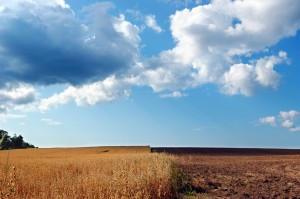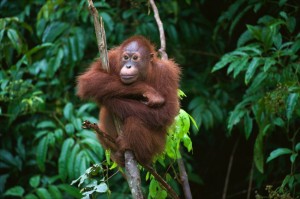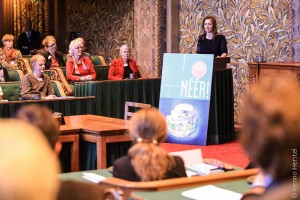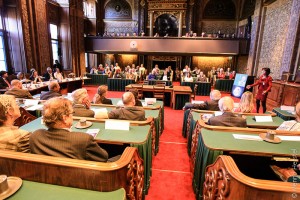Worldlog Semana 23 – 2013
La semana pasada presente mi nuevo libro científico titulado ‘Méér! (Más) que fue presentado en el Senado. Los científicos que prestaron su aporte al nuevo libro dieron una serie de análisis con el enfoque a los límites de la tierra como punto de partido para nuestras acciones. Méér! es una guía para políticos, los responsables políticos y los ciudadanos para hacer un cambio radical hacia otras opciones políticas más duraderas.
En Méér! junto conocimientos científicos que dan una idea de los crisis del momento para buscar una solución en conjunto. Las contribuciones provienen de los científicos independientes que están preocupados por el futuro de los seres humanos, los animales, la naturaleza y el medio ambiente y buscan encontrar soluciones viables para la crisis desde varios ángulos.
Esta es la información escrita en la parte de atrás del libro:
Méér! se ha convertido en el tema central de nuestra sociedad: más de todo y más de lo que hay. En las últimas décadas de prosperidad sin precedentes la creencia ha tomado fuerza de que el crecimiento de nuestra economía no sólo es sin fin, sino también un requisito para la felicidad y la prosperidad. Donde la economía alguna vez era la ciencia de la producción y distribución de bienes y recursos escasos, se ha vuelto ahora la atención casi exclusiva para el dinero y las causas monetarias. La crisis del sistema que se presentó en 2008 como una crisis bancaria, ahora se manifiesta como crisis monetaria. Y está claro que también tenemos la crisis de la biodiversidad, la crisis climática, la crisis alimentaria mundial y otros problemas de escasez que amenazan la prosperidad y el bienestar hasta en lo más profundo.
Esta semana nos hemos dedicado a la agricultura sostenible. La agricultura sostenible no debe ser obstaculizada por las nuevas exigencias que la Unión Europea requiere para el registro de las variedades vegetales. Afortunadamente, la Cámara apoyó por unanimidad una moción de nosotros!

La Unión Europea ha propuesto que se cambien las normas relativas a la producción y comercio de semillas. En él se establecen reglas estrictas para las semillas que pueden ser utilizadas en la agricultura. Todas las variedades de plantas tienen que ser registradas de acuerdo a esta propuesta, y tal registro cuesta mucho dinero. La propuesta Europea ha causado mucha intranquilidad en los agricultores urbanos, horticultores y agricultores y los ganaderos ecológicos. Temían que se permitían únicamente las semillas registradas y que no se les permitiría mas usar el intercambio de semillas.
En la propuesta final se dio a conocer que los individuos no caerían bajo las nuevas normas. Incluso los pequeños criadores de semillas y las variedades tradicionales de semillas no tendrían que cumplir con tales nuevas normas. Nos parece que todos los nuevos requisitos de registro son demasiado estrictos y que podrían causar un obstáculo para la agricultura orgánica.
Por lo tanto, hemos presentado una moción pidiendo al gobierno que en las negociaciones sobre la propuesta de la Comisión Europea se protegen en primer lugar los intereses de los pequeños ganaderos y la agricultura ecológica y proteger estos intereses.
Una mala noticia para la selva de Brasil. De una investigación resulta que la deforestación en Brasil resulta en semillas de arboles mas pequeñas.
Firmen aquí para salvar las 1,2 millones de hectáreas de hábitat del orangután en Sumatra. Esta área se encuentra en peligro inmediato por la industria del aceite de palma.
 Hasta la semana entrante! Marianne
Hasta la semana entrante! Marianne
Last week, I presented my new scientific volume titled More! to the Upper House. Scientists who contributed to the new volume, presented a range of analyses which urge us to base our acts on the borders of the earth. More! is a guideline for politicians, policymakers and civilians to make a radical change to other and sustainable policy choices.
In More! I have compiled scientific insights which analyse the current crises and help solve them in conjunction with each other. The contributions come from independent scientists who are concerned with the future of humans, animals, nature and the environment, and advocate practicable solutions for the crises from various angles.
This is the information on the back cover:
More! has become the key theme of our community: more of everything and more of what is available. During the past decade of unprecedented wealth, we started to believe that the growth of our economy is not only unlimited, but also a condition for happiness and wealth. Where economy was first the science of production and distribution of scarce goods and means, it is now almost exclusively about money and monetary issues. The system crisis that first presented itself in 2008 as a banking crisis, is now manifesting itself as a monetary crisis. And additionally, there clearly is a biodiversity crisis, a climate crisis, a world food crisis and other scarcity issues, which seriously threaten our welfare and wealth.
We made an effort for sustainable agriculture this week. Because sustainable agriculture should not be hindered by new regulations on the registration of plant varieties, set by the European Union. Fortunately, the Upper House unanimously seconded the motion!
The European Commission made a proposal to amend legislation on the production and marketing of seeds. It contains strict rules on seeds that are permitted to be used in agriculture. In accordance with the proposal all plant varieties must be registered, but registrations are expensive. The European proposal has caused a great deal of unrest among city farmers, vegetable gardeners, and among organic farmers and breeders. They feared that they would be permitted to only use registered seeds, and that the exchange of seeds would be disallowed.
The definitive proposal showed that the new legislation does not apply to private persons. Small seed breeders and traditional seed varieties would not have to comply with any new registration rules. We believe that the registration rules in the proposal are too strict, and could be an obstruction for organic farmers.
That is why the Party for the Animals called for a motion, requesting the government to prioritize the interests of small breeders and organic farmers in the negotiations about the European Commission’s proposal, and to protect their interests.
Bad news for the rainforest in Brazil. Research suggests that rainforest deforestation in Brazil leads to seed shrinkage.
Sign here to save 1.2 million acres of habitat of the orangutans on Sumatra. This area is endangered by the palm oil industry.
Until next week! Marianne

